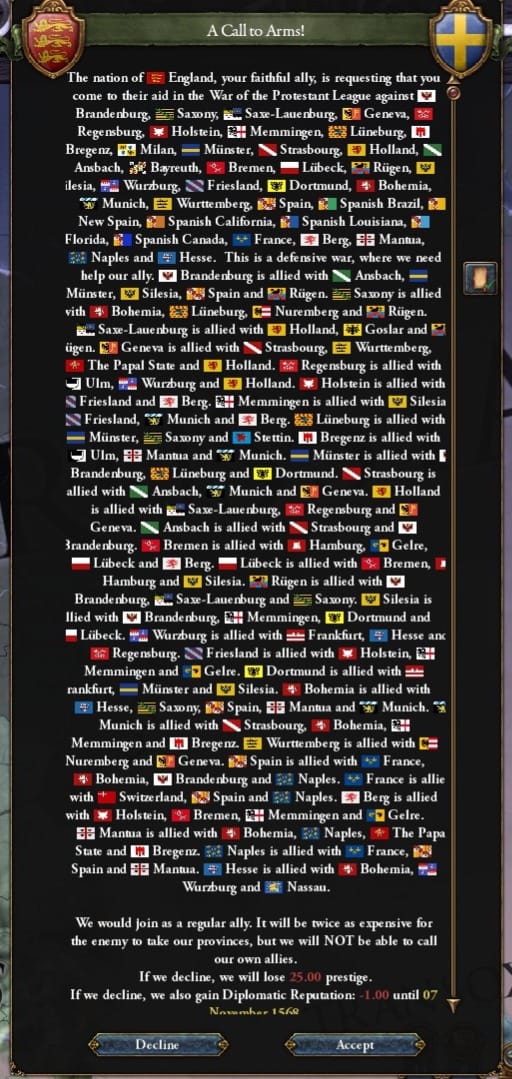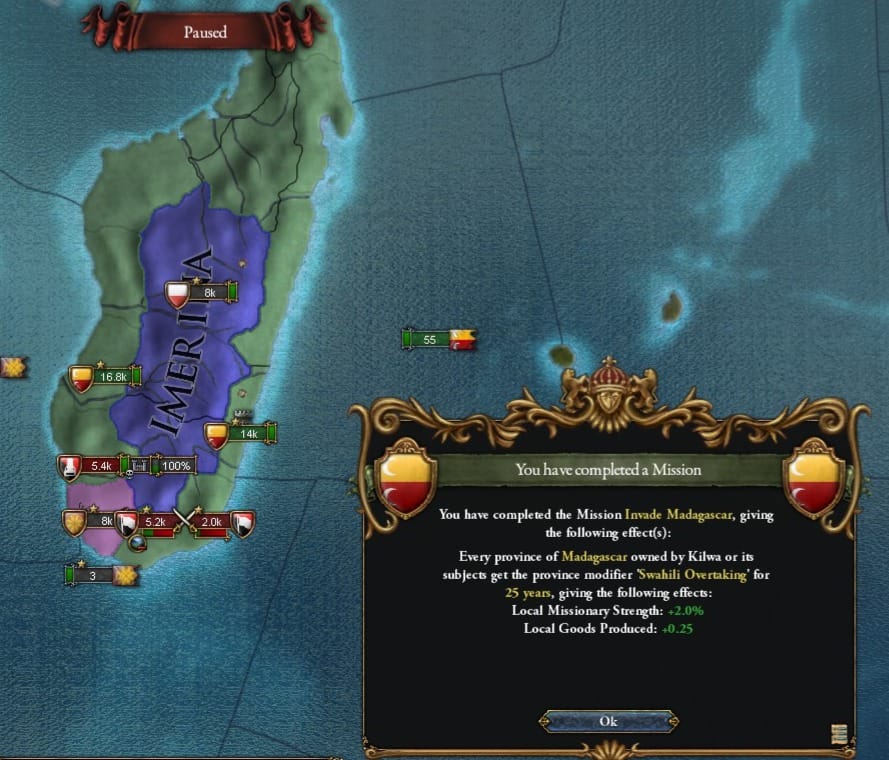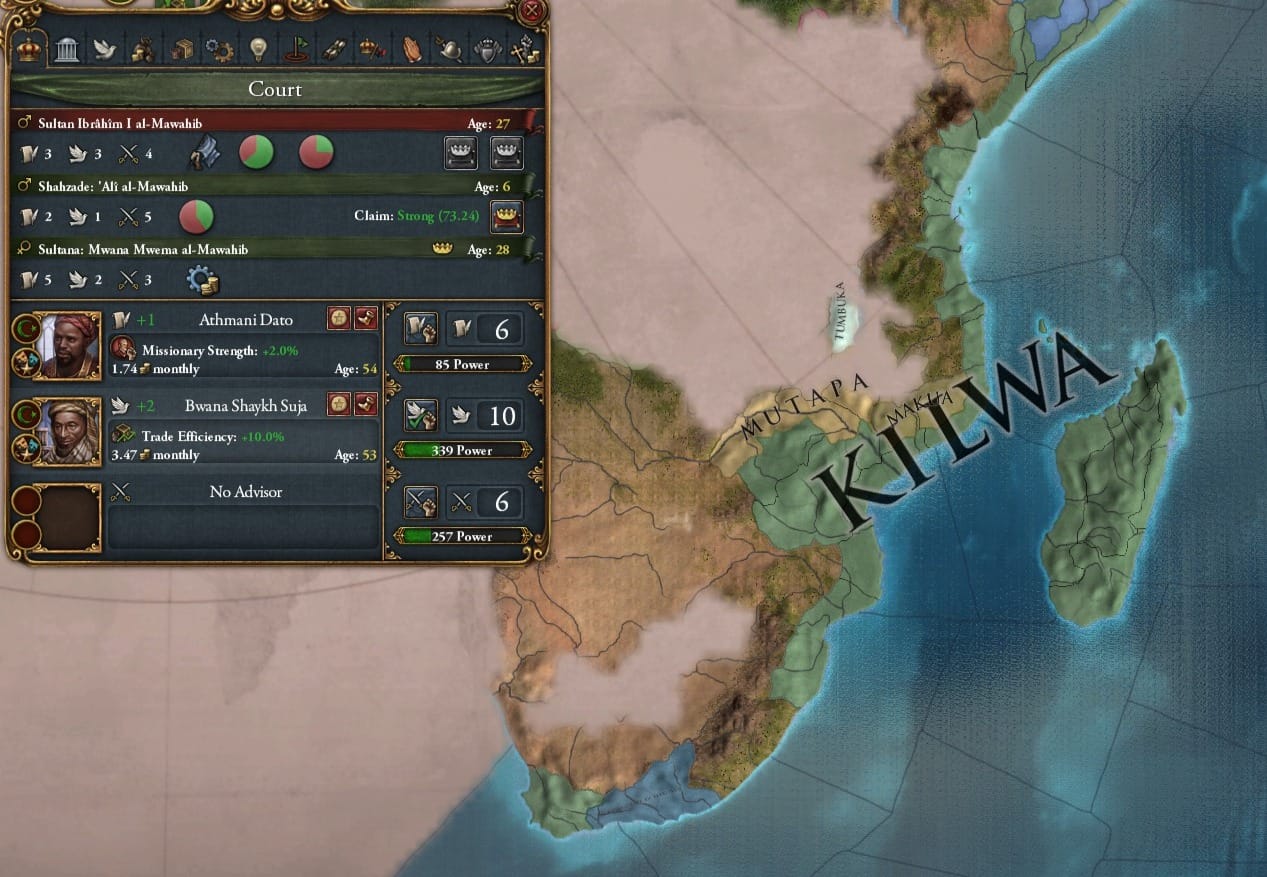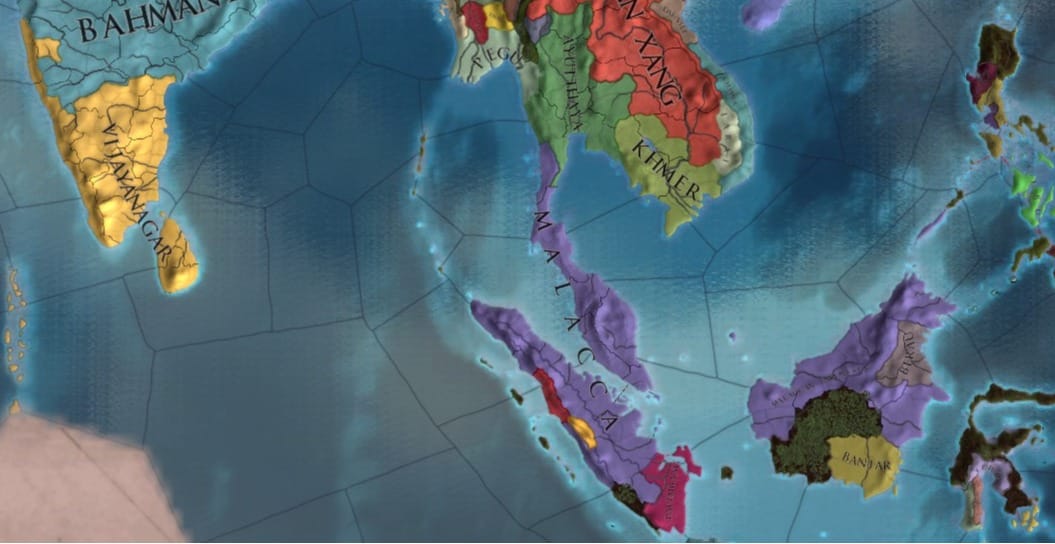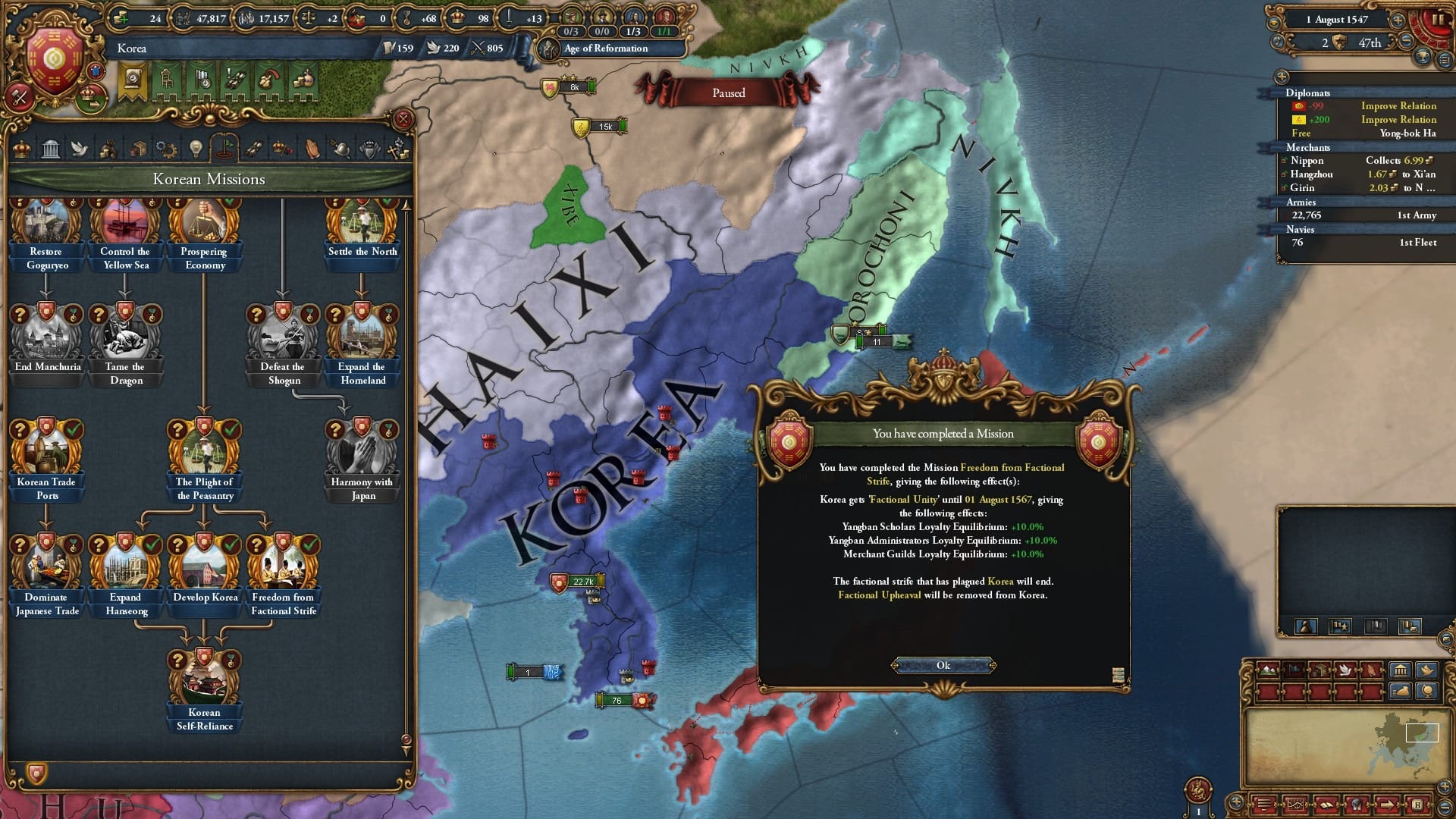Learning Europa Universalis IV

It was a wish, then a rumour, followed by an open secret, but eventually, Paradox Interactive announced the upcoming Europa Universalis V. In the months since then, they have delved into the gameplay mechanics, the flavour, and the beautiful map itself, but just recently, they finally gave us the release date.
4th of November 2025
Wait...
I can feel it building...
Is that... hype?
My friends, it is hype, but unearned. Because whilst I am foaming at the mouth to add another glorified spreadsheet/map-painting game to my Steam catalogue, I have a confession: Though I have played a mere 67 hours of the game since 2019 when I bought it, I still do not truly understand how to play Europa Universalis IV with any degree of competence. If I am to justify paying $79.99 for the fifth installment of the game, I have to earnestly give EU4 another go, but this time, with unending commitment.
Let me fill you in on what this video game is at its core. Fundamentally, Europa Universalis IV is a real-time (with pause) grand strategy game based on simulating the historical (and ahistorical) development of the globe between 1444 and 1821). It allows the player to select one of the over 500 nation-states and guide the "spirit" of their nation through the turmoils of early modernity. Consequently, players navigate historical shifts like the emergence of new technologies, the spread of nascent religious movements and philosophical ideas, and consolidation of political and economic arrangements. Despite the name of the game itself, EU4 is global in more regards than one might expect, though it does have moments worth critical evaluation with specific examples including the dreadfully antiquated "Age of Discovery" and the development studios' strong prioritization of European institutions as fulcrums for transforming global history (if it is ahistorical - where are the earnest alternatives to 16th century colonization?). As someone who has played grand strategy 4X games like these since I was ten, this has been a persistent challenge within this genre, but it is not the topic of this post.
EU4 was released back in 2013 (the summer I graduated from high school) and has had its share of game updates over the years, but the vastness and depth of this game comes from Paradox Interactive's post-launch support. This support takes the form of a whopping twenty paid expansions/immersion packs to the game (not including cosmetics) since launch. This content ranges from fleshing out specific regions with more flavour (like Iberian nations in 2018's Golden Century immersion pack) to introducing completely novel gameplay mechanics (like Republican governments in 2014's Res Publica expansion). Through either poor judgement or chronic impulsivity, though likely a combination of both, I have all of these paid downloadable content packs. With a mere 67 hours of playtime, I have to justify those erroneous financial decisions somehow.
The Goal and the Prep
With all this said, my goal is to learn how to play Europa Universalis IV. But "learn how to play" is vague, so let's transform my bullshit goal into a SMART goal.
Okay. This is what I have and it is better (though not perfect): I will learn how core game mechanics work by playing three different nations and fulfill 50% or more of those three different nations' missions (the assumption is that completing missions is a strong indicator of success in the game) by the 4th of November.
If all goes well, this will be posted around that date, which will result in Taylor receiving this post in their inbox. They will read this post. Subsequently, with my oratory prowess, I will convince them (but if I am being honest - myself) that purchasing Europa Universalis 5 is wise decision.
To begin learning EU4, I started by reading the EU4's beginner's guide on the wiki and watching this video posted by the Europa Universalis Youtube channel. Stressed immediately in the wiki's guide was that "numbers are hidden in tooltips as to not clutter the screen with too much information." In this regard, it is similar to Paradox Interactive games broadly. Under the map and the user interface itself is a spreadsheet of numerical values that correspond to specific calculations relevant to resources and game mechanics. As an example, the treasury, which is a basic resource pool of ducats (or money) has a relationship with taxation, military maintenance costs, and trade income (along with dozens upon dozens of other factors). If you have ever done a household budget, this should be familiar (also - if you have not done a household budget - may god have mercy on your finances). As the wiki guide states further on, much of the game "is simply monitoring all the dials and knobs of the machine of a nation." The video posted on EU4's Youtube channel provides an overview on these metrics. It explains how the UI and country overview tabs communicate game information to the player. The video itself gives the rightful impression that the game is just a series of green and red numbers with a world map overlay and a busy UI that must be parsed out with regular in-game pausing. Whilst reading and watching tutorials can certainly assist in learning new games, the act of playing through these systems is fundamental for me to learn - as it is for many folks. I can have the board game Root or Twilight Imperium explained to me, but it is only through the play that I can learn by applying basic game principles. Preparation has given some direction, but ultimately, I know I must start playing to learn, rather than learning to play. Notice that inversion? What a literary trick! In any case, the main takeaway is to be patient by keeping the game speed slow and pausing often. Even as I type that last sentence, I know impatience will be the biggest challenge for me.
Part 1: Getting Familiar with the UI, Tooltips, and Event Spam on the Iberian Peninsula!
For my first couple games of EU4, I started out in Portugal for a single-player game and Castile for a multiplayer game (with Dylan as Portugal). These two Iberian kingdoms are considered fantastic options for novice players. As Portugal, I really took my time to figure out the user interface. Each green or red number demonstrated the kingdom's broader trends. When I moved towards an expansion in state expenditures, I paused to figure out how I should respond and made cuts to unnecessary maintenance costs for forts and naval vessels. When I noticed the clergy were growing restless, I worked to win over the burghers as a counterbalance (gold is Portugal's new god anyway). This is the tinkering that the guides refer to. They are often minor adjustments, but they require consideration in order to pivot in the right direction. Eventually, I secured a foothold in North Africa and Brazil, but as I expanded along the west African coastline, logistical challenges resulted in military failure. I would likely have been able to eventually recover, but I had learned so much that I wanted to start again with a new nation-state.
Whilst playing as Portugal demonstrated how vital slowing down is, it was by playing as Castile, in the midst of my single-player Portugal game, that showed me how foolish rushing through management can be. Immediately upon beginning a war with Granada (and dragging Dylan's Portugal in with me with the promise of Moroccan land), a broader regional conflict rendered us ineffective for the rest of the session. Essentially, we had failed to seriously evaluate the campaign and properly prepare. This resulted in several defeats in the battlefield. In order to respond to these failures, investments were made from the state treasury into mercenaries to bolster the weakened regiments. A debt-spiral followed, resulting in inflation, as well as political instability. In either game, the fundamental lesson I learned was to take my time. Any Paradox game will teach this to the player and it is through losing that I learn this again, but this time with Europa Universalis IV.
As an additional note: EU4 is bloated with event spam. Though many events were relevant to me, I would likewise get barraged with lots of bullshit from other realms. Like seriously, I do not care about a royal marriage in northern Italy or alleged heresy in Aachen. Dylan promptly informed me as we played our game that these could be toggled off and on, but with so many categories of events, it was still too much for a novice player to sort through. One might suggest that in a historical grand strategy game that eventually triggers the Protestant Reformation, that a European kingdom might want to seriously contemplate the collapse of Catholic hegemony over the continent, but again: gold is Portugal's new god.
Part 2: Success and Failure in Korea, East Africa, and the Andes
Next I moved out of Europe to play Korea. They start as a tributary state of Ming China and bordered to the north by Jianzhou (just the neighbourhood steppe horde). During this game, as I followed along with the mission tree, I learned how to leverage Administrative, Diplomatic, and Military Power into developing my provinces. Using a simple and oddly small button hidden away in the province tab, I finally made came the understand how a player can not only develop a region, but also build a tax base, increase recruitable manpower, and expand crownland. As I developed the kingdom's economy, I expanded my military modestly, and created diplomatic relationships with the Ming and other nation-states in Manchuria. Then, from the northern border, Jianzhou invaded. The initial stages of the war seemed to indicate our army would secure our lands and possibly even expand, but eventually, the tide turned against us. With my allies routed and surrendering, I unconditionally surrendered too and nearly a third of my land was handed over to Jianzhou. I quickly stabilized during peacetime and rebuilt my military, but a Japanese power declared war on us next. This time, my navy unquestionably held them off, but with the truce up with Jianzhou, they invaded again. It was over.
I started my next game in Kilwa on the east African seaboard. Historically, this was a mercantile powerhouse and it proved similarly true for myself. I took the same principles I learned from my prior game and applied it to my provinces here, but I also took more risks with expansion and learned to use military better. I expanded along the coastline with my northern foothold of Mogadishu in the Horn of Africa to the southern tip of the Cape Peninsula. Additionally, I managed to wage a successful invasion of Madagascar and even started a few colonies in Australia, Comoros, and a few islands of Sumatra. In these newly-conquered territories, I converted them to Sunni Islam and put down rebellions constantly. All of this was worthwhile, because with my heavy focus on trade and development, I started reaping the rewards of investing in a maritime economy. Our trade power grew stronger and my treasury filled with gold. As it goes: the rich get richer.
Then the Europeans fucked it all up. Like immediately, upon setting up their own colonies in today's South Africa, Portugal and Spain declared a joint war on me. I struggled initially, but fended them off enough to gain a white peace settlement, but this meant that I had to concede to Ethiopia when they opportunistically invaded during the chaos. Unlike other games, I was financially resilient enough that I could pay down loans and stabilize my economy, but again, despite my diplomatic efforts, the Portuguese and Spanish forces attacked my provinces once the truce was up, with Ethiopia, once again, taking advantage of the situation. In any case, I concede and resigned the game. I had fulfilled more than 50% of Kilwa's missions! Huzzah!
Upon defeat during my Kilwa run, I decided to try my hand in, as EU4 refers to it, the "New World" (oooof very outdated). Given the focus of the game, playeable nations like the Blackfoot, Mi'kmaq, and Mapuche lack depth and flavour that others receive in Europa, Asia, and to a lesser extent, Africa. There are three New World powers, thanks to the Winds of Change DLC, that received Paradox Interactive's attention: the Mayans, Aztecs, and Incas. I went for the Incas, because I imagined I had more time to prepare for a potential European invasion. I started as Cuzco and through proper military planning (which I had been improve over the last couple games) and a bit of diplomatic skulduggery around other neighourly powers, I was able to form the Inca Empire after several wars.
After forming the Inca Empire, the cracks were made apparent. Within EU4, any annexation of new territory carries the risk of instability. Resolving issues of stability requires using administrative power to (1) integrate provinces in your realm and (2) raising the stability meter (which ranges from -3 to +3). Additional measures also exist for long-term stability, like accepting new cultures, strengthening religious tolerance, lowering the National Unrest modifier, or gaining new ideas along their Idea groups (Humanism is an example). With instability through rapid expansion, there was a surge of rebellion that I subsequently crushed. In the aftermath, I worked to increase development and push for religious reform. I was doing splendidly with development, but eventually notifications popped up and drew concern. It was smallpox and that means one thing: 16th century Europeans are nearby. Of course, the spread of smallpox undermined my civilization quickly, but I thought I could fend it off. Once there was a nascent Spanish colony on the shore, I made quick advance to rid them from the continent, but it made no difference. Spanish gunpowder won the day and I was defeated.
Part 3: With Sweden and Korea Comes Joy Through Victory
With two runs being destroyed by Spanish conquistadors, I wanted to try my hand at playing in Europe again, because this time, I wanted to hit the Spanish where it hurts: The Catholic Church. And with that, I started as Sweden. In the early decades of development, I worked to improve the base tax and base production of Sweden's core provinces, with my diplomatic and military pursuits being oriented towards securing independence from Denmark, followed by the annexation of Norway, Novgorad, and eventually annexing Denmark itself. Through those decades, I secured an alliance with England and Poland, both of which played a major role in my conquests. With expansion under control, I bolstered my military, affirmed by diplomatic ties with newly-formed the Polish-Lithuania Commonwealth, and started working my way through technologies (specifically administrative). Eventually, the Protestant Reformation began in central Europe and I began converting my realm towards the nascent Protestant faith (much to the Papacy's displeasure). My missionary strength - which gauges my ability to convert provinces - seemed to be fairly good, as it took very little time for my people to drop Catholicism. It is truly stunning what happens when the biblical scripture is not gatekept behind the Latin language.
As a Protestant stalwart in an increasingly hostile Catholic Europe, I found that diplomatically isolated, despite the fact I did not concern myself with the religious affairs of Central Europe. This diplomatic isolation was made more challenging when my kingdom inherited territory from Burgundy. This territory was a surprise to me, but it can happen when royal marriages yield familial land. As a Protestant nation with some new territory (which was desired by the Kingdom of France, I had few friends. I did, however, had my good ol' pal, Poland. We were historic allies and stood by each other as our nations emerged as continental powers, with Poland forming the Polish-Lithuanian Commonwealth and myself forming Scandinavia. As we grew up together, I turned inward to focus on faith and productivity (classic Protestant Work Ethic) and my ally routinely demolished Russia. Eventually, our relationship fractured. It could have been my greed for the greater Baltic Sea control or my ally seeing an opportunity for a betrayal, but I could not match the waves of French, English, Holy Roman Empire, and Commonwealth forces taking chunks of land away from my kingdom. But guess what? I fulfilled more than 50% of Sweden's missions!
The following run was an island-hopping escapade as Malacca. As a Maritime power, I expanded along Sumatra, Borneo, and the Malay Peninsula. Whilst the expansion was easy, maintaining order was more challenging with rebellions building over time with dissent including nobles, religious zealots, peasants, and separatists. As a player, I am afforded the opportunity to accept their demands, suppress them through harsh treatment, or provoke unrest to quash it entirely (the latter two were used the most). More important to learning the game, I focused on improving my knowledge of naval warfare and trade mechanics (like control over trade nodes). Unfortunately, after expanding too ambitiously and behaving (quite frankly) like a greedy fuck, neighbouring kingdoms put me in my place in a military coalition. This is fair, I did break a truce and my allies appropriately abandoned me. Note to self: trust is important in geopolitics.
For my last run, I came back to Korea. This time with a wealth of knowledge gained over my last several runs. This time, I worked to build up a network of diplomatic ties oriented around ruining Jianzhou within a couple decades. In undermining their early game strength, I opened up Manchuria for further annexation and used my ally of Oirat to chip away at regional powers. In the midst of this slow process (a deliberate choice to avoid overextending myself like I had in prior games), I continued to develop my economy and military capabilities. Eventually, Korea's overlord of Ming China faced internal chaos and imploded, resulting in Oirat and I taking the opportunity to backstab the declining power. For nearly a century, China was divided and this allowed Korea to prosper. Eventually, Oirat and Korea found itself getting surrounded by the rapidly-expanding Russia, unified Japan, and the Wu. Oirat crumbled within less than a decade, leaving me isolated and with no strong ally to back me up in a defensive war. The knives came out and carved up my kingdom just as quickly as Oirat fell apart. But, again, I had fulfilled more than 50% of Korea's missions!
Conclusion
As of the 26th of October, I completed over 50% of the missions for three different countries: Kilwa, Sweden, and Korea. But the question inherent to these challenges was not merely fulfilling these missions, but also learning core game mechanics. And I did. Most prominently, I had learned about managing my economy in Europa Universalis 4 through constructing appropriate buildings, using Administrative and Diplomatic Points for development, managing my treasury, and expanding my trade power through naval control. By improving on this skill in each game, my kingdoms prospered during peace times. This also allowed me to better learn about how the game mechanics work in other aspects of realm management, from utilizing new technologies to maintaining domestic stability (even after ambitious conquests). As for military, I certainly learned over these games, but I would consider it an area of growth. Concepts like army professionalism, military tactics, and fort defense is still something I would like to look. As for Europa Universalis 5, providing the game does not bomb at launch, I am going to wait for my birthday or a sale (Dylan has wisely reminded me to not pre-order, even though I want to for reasons beyond my understand). But while I started hyped for the next installment, I have been really having fun with Europa Universalis 4 and I am still appreciating this relic of a grand strategy game.
Kilwa: Missions: 15/22
Sweden -> Scandinavia: Missions: 30/59
Korea: Missions: 17/30


